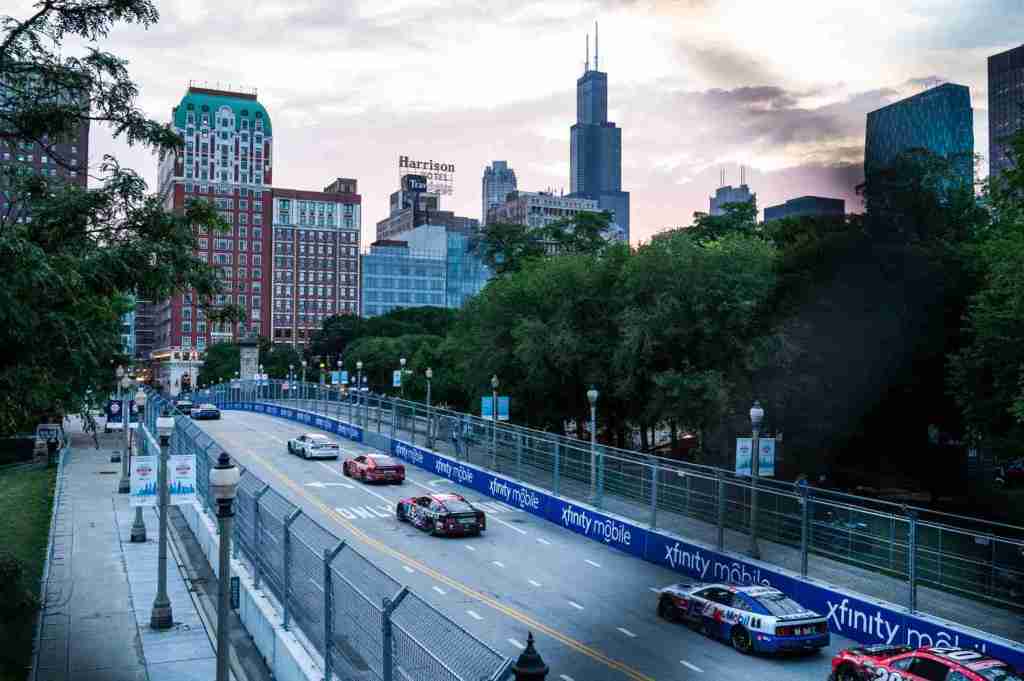DOWNTOWN — Many downtown residents would not support NASCAR returning to Chicago, according to a survey by Ald. Brendan Reilly (42nd).
The survey from Reilly’s office generated 662 responses regarding the inaugural NASCAR Chicago Street race, July 1-2, which booked much of Grant Park’s summer season due to setup and teardown. Residents were asked about three questions related to NASCAR awareness, traffic closures and future NASCAR races in Chicago.
More than half of those surveyed – 54 percent – said they would not support holding future NASCAR races in Chicago. About 37 percent of those surveyed said they would support another NASCAR race and eight percent said they felt indifferent.
When it comes to traffic, 58 percent of respondents said street closures during the race negatively impacted their travel, compared to 34 percent who said it did not affect them.
When asked if neighbors were satisfied with NASCAR’s outreach work, about 38 percent said yes, 32 percent said no and 29 percent said they felt neutral.

Reilly, whose district includes Grant Park, blasted former Mayor Lori Lightfoot for her lack of transparency in bringing NASCAR to town, saying he had not been involved in the plan before hours before the announcement.
Reilly said he thought the city Three-year deal with NASCAR could still be canceled, but praised NASCAR executives for their communication with his office and neighbors as the July race approaches.
According to an Aug. 25 edition of his newsletter, the alderman said the survey responses, along with the results of an economic impact study recently commissioned by NASCAR, will help determine his position on the future of street racing.
The study is being conducted by the Sports Industry Research Center at Temple University and was ordered in July by Choose Chicagothe tourist branch of the city.
Time is of the essence since NASCAR and the city can opt out 180 days before next year’s second event, according to NASCAR’s contract with the Chicago Park District. This means that a decision must be made before the end of the year.
The NASCAR Street Race is estimated to bring $113 million to the local economy, according to a February report from the Sun Times. But that puts street racing behind two other major Grant Park events: Sueños and Lollapalooza.
In its first year, the Sueños music festival in Grant Park generated $120 million and this year generated $181.6 million in economic impact for the city, according to studies commissioned by the organizers of the C3 festival. Sueños takes second place behind Lollapalooza which generated $335.4 million last year in direct and indirect economic revenue in Chicagoaccording to a study commissioned by C3.

Credit: Colin Boyle/Block Club Chicago
The street race has also been the subject of controversy over the length of time it has occupied the green space of Grant Park.
Initially, the race was planned to last two weeks. Block Club Chicago revealed that the setup, event and teardown had been extended to 39 dayswho originally resulted in softball leagues being banned from playing at Grant Park.
Licensed sellers in Grant Park also said they I had trouble making money because they were forced to close their doors for several days due to street closures and the organization of races around the park.
Race officials expected 100,000 people for the two days of racing, but lighting and flash floods shortened runs and canceled concerts like Miranda Lambert and Chainsmokers.
Ticket holders mostly stayed away during the torrential downpours until racing began later in the evening, leaving the event virtually empty throughout the day.

This year, NASCAR paid the Chicago Park District a $500,000 permit fee. The racing giant is expected to pay $550,000 in 2024 and $605,000 in 2025 if those races are held, according to its contract.
The Park District will also receive 15 percent of net commissions on concessions and merchandise, plus $2 per admission ticket, the contract states.
Asked Aug. 2 whether NASCAR racing would resume, Mayor Brandon Johnson said he would make the decision “a true community-led process.”
“As far as… the disruption that has taken place and how the city of Chicago has benefited from it, that’s something that we really need to dig a little deeper and explore… and then make sure that there’s a real community-led process with local aldermen. to help lead that discussion, and then a decision will be made based on those conversations,” the mayor said.
Subscribe to Block Club Chicago, an independent, 501(c)(3), journalist-run newsroom. Every cent we earn reporting on Chicago’s neighborhoods. Already subscribed? Click on here to support Block Club with a tax-deductible donation.
Listen to the Block Club Chicago podcast:

